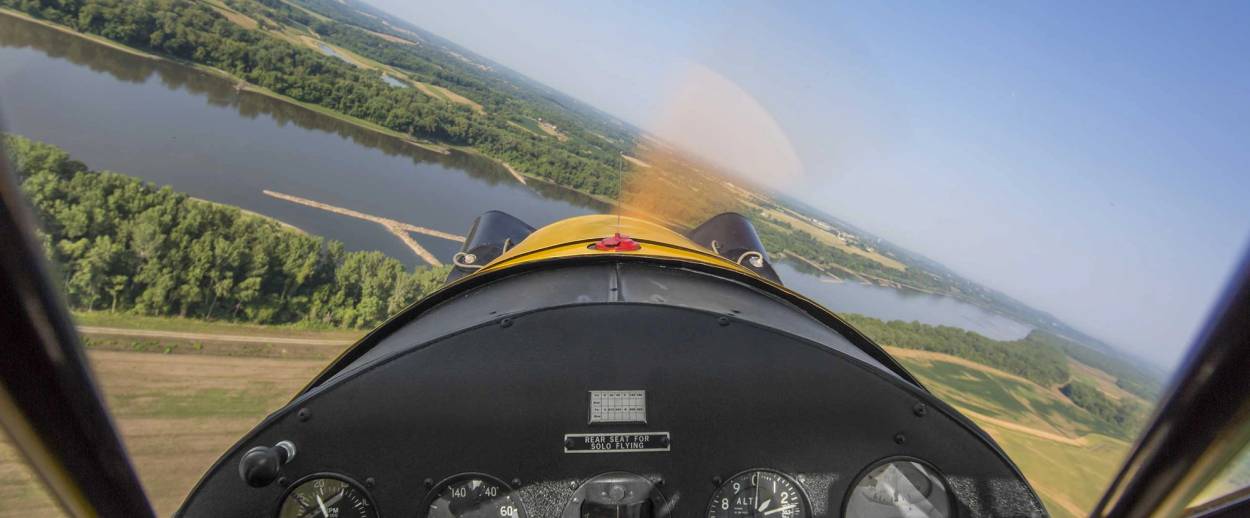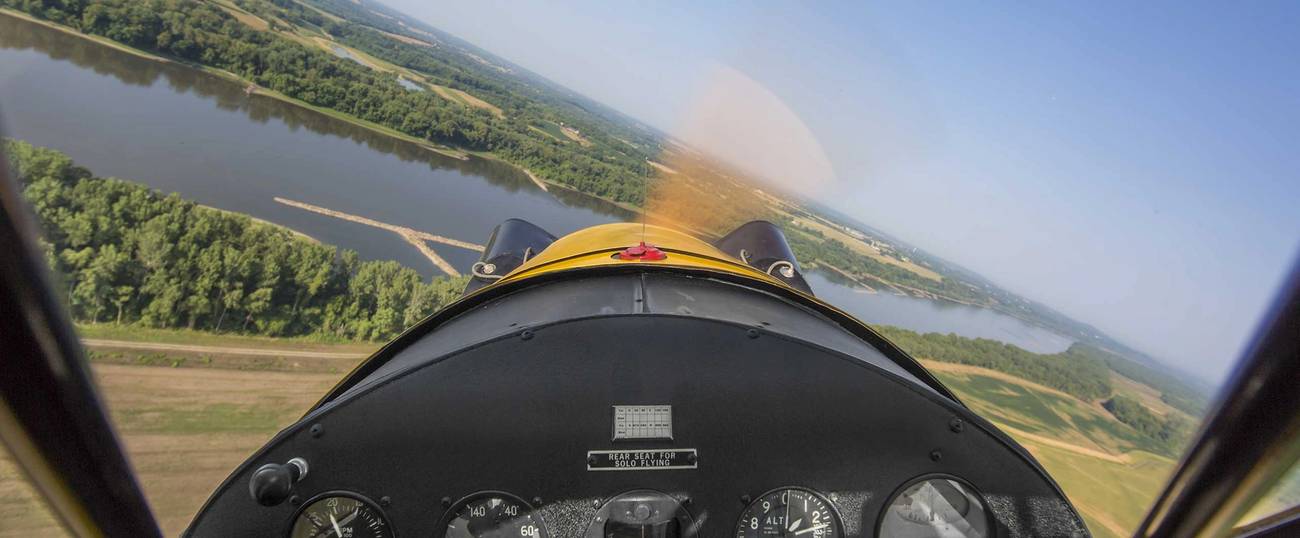Two Wings and a Prayer
How facing a plane crash changed my personal theology




I don’t spend too much time thinking about God.
As a full time cantor serving a Conservative synagogue, that’s decidedly a strange thing for me to say. I fill my professional hours leading services, literally singing praises to God. I joyfully teach kids and adults how to chant the words of the Siddur, as well as the proper way to recite a haftarah or read from the Torah. Isn’t most of my time devoted to God?
In fact, while I find the poetry of our prayers beautiful, and constantly connect with the meaning of the texts, I look at them more as an expression of our humanity and potential. The Hebrew word for “prayer”—l’hitpalel—is a reflexive verb, meaning that prayer, by definition, is something that affects one’s own being, rather than words spoken to appease a distant deity. When I recite the Motzi before eating, I look at that as a wonderful moment to stop and be grateful: a magnificent chain of events—growing, harvesting, transporting, and preparing—culminated in having this food on my plate. The Motzi becomes a way to connect us with that process while expressing our gratitude for the other people involved.
Almost hiding within the pages of the Torah service each week is a brief prayer called Gomel, which may be recited by someone who has escaped a dangerous situation or recovered from a serious illness. Traditionally, people who completed a voyage across the ocean would also recite it—and while that still takes place, I’m not sure successfully completing an airline flight to and from Europe is what the rabbis of the Talmud had in mind when these words were first recorded.
Although I welcome others to participate and find their own personal meaning in prayers, this particular prayer has never resonated for me. I’ve always been disturbed by the inherently superstitious implication: A person avoided what might have been a tragic accident due to God’s favor. I’ve always wondered how we should then view those that did not escape danger safely. Did God not answer their prayers? This was definitely not my theology.
Until, that is, I found myself in an airplane with no power.
*
A number of years ago, I fulfilled a lifelong dream and earned a pilot’s license. I have always considered flying to be a safe hobby—as the saying goes, the drive to the airport is statistically more dangerous than taking a flight. I’m cautious, I don’t take any unnecessary risks, and if the weather is even slightly questionable, then I simply don’t fly that day. Because I owned a small airplane, I was also able to personally ensure that it was maintained to the highest level of safety.
One particular afternoon I decided to go for a short flight. I completed a thorough preflight inspection of the plane, which includes checking the fuel and oil, the control surfaces, and the instruments. Each time I prepare to fly, I open up the cowling and look inside at the engine, making sure that everything appears normal. (Those of us who park our planes outside might sometimes find a small bird’s nest next to the engine.)
With everything looking good, I started up the plane and ran through an additional checklist of items, all to ensure that the engine was in complete working order before taking flight. This time, just like the other approximately 1,100 hours I’ve flown in the past 14 years, everything was completely routine. It was time to take off.
At most small airports, there is no tower to direct traffic. Each pilot announces his position and adheres to a standard procedure. One critical decision is choosing which runway to use for taking off and landing, and this is determined by the wind direction. With the wind coming from the west, as it often does, I lined up on the appropriate runway and advanced the throttle. The plane responded as usual, built up speed, and as I applied a light amount of back pressure on the yoke, became airborne. A perfect takeoff.
About 10 seconds later, my engine died. I was maybe 200 feet above the ground and I lost all power. The end of the runway had already passed below me and all I had in front of me were trees.
During flight training, a pilot constantly trains for and practices emergencies. Even a loss of power, while obviously a serious situation, is nothing to panic about. Planes don’t fall out of the sky when the engine quits; they just become gliders. When you’re flying at a few thousand feet, you’ve got a lot of time to troubleshoot, try to get the engine going again, find a suitable place to land the plane, and then maybe contact air traffic control to declare an emergency or request assistance. The higher you are, the more time you have. Unfortunately, I was at a mere 200 feet—that translates to perhaps 60 seconds.
While I don’t remember every single detail, I know that I reacted immediately. Without uttering a word of surprise (or worse), I promptly lowered the nose of the plane and turned to an adjacent dirt field that I knew was to my left. I recall thinking that I couldn’t believe this was really happening, as I made a fast and bumpy but not terrible landing in the dirt. As I attempted to brake and bring the plane to a stop, my next challenge was having to steer away from a chain-link fence. The plane finally came to a stop in some grass next to the runway. There was not a scratch on me or the plane; I’m sure that I made much worse landings when I was a student.
I sat in the cockpit for a few moments, adrenaline flowing, sweat pouring, and incredulous at what had just happened.
And then, against everything that I thought I believed about God and Judaism, my next thought was that I needed to bentsh Gomel at services.
What changed my mind?
The Gomel is a short blessing, made up of just a handful of words: “Blessed are You, God, who gives those who are deserving the favor of goodness.” Then the congregation responds: “Just as God favored you with goodness, may God continue to do so.”
The wording is strange; one might think there should be an outright expression of thanks or, like the well-known Shehecheyanu, an acknowledgment for having reached this day safely. Instead, it almost implies that God is capricious—OK, you seem deserving of favor, so you can have a good outcome.
But I realized that this is exactly how my own situation played out. There were certainly elements of skill—my training kicked in perfectly and I did everything correctly. But then there were random elements as well. The wind happened to be blowing from the west. If it had been coming from the east, I would have used the opposite runway. There was no dirt field on that end and I would never have cleared the trees at the end of that runway. And for all the possible and random times for this emergency to happen, I was fortunate to be flying out of my home airport, where I was familiar with every inch of the area.
I’ve come to understand that the words of the Gomel reflect the fact that as much as we seek to control every facet of our lives, we simply can’t. However, this goes way beyond the typical there-are-no-atheists-in-foxholes interpretation. Instead, when reciting this blessing, we acknowledge the Big Picture—and seek to accept our own place and where we fit in.
In my case, I had the opportunity to give thanks for my flight instructor who taught me how to deal with an emergency (and later I did thank him!), for my own skill that took years of practice, but also for what was out of my control—the precise time and place where one $20 hose chose to become unattached, starving the plane’s engine of air. Life is made up of random, chaotic moments that exist alongside our own attempts at controlling every aspect of our day. Deciding to personally recite Gomel allowed me to take a transformative event and find meaning and gratitude in these two disparate aspects of our lives, which are forever intertwined.
***
Like this article? Sign up for our Daily Digest to get Tablet magazine’s new content in your inbox each morning.
Cantor Matt Axelrod is the author of Surviving Your Bar/Bat Mitzvah and Your Guide to the Jewish Holidays. He has served Congregation Beth Israel in Scotch Plains, N.J., since 1990.